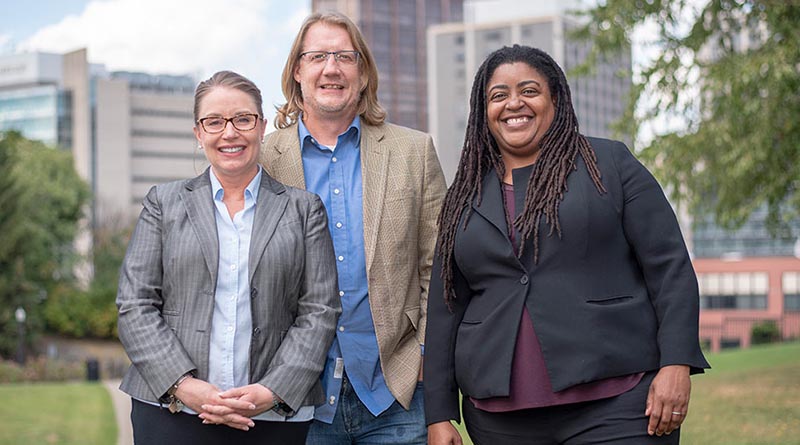Can Holistic Legal Representation Improve Outcomes for Local Kids in Court and in School?
A national leadership program from the Robert Wood Johnson Foundation has given a team of Duquesne and University of Pittsburgh professors the chance to see if their innovative approach to holistic legal representation can improve the juvenile indigent defense representation and, in turn, young peoples’ life outcomes.

The School of Law’s Tiffany Sizemore and the School of Education’s Dr. Tammy Hughes, along with Dr. Jeffrey Shook at Pitt, are members of “Team Pittsburgh” in the newest cohort of the Interdisciplinary Research Leaders (IRL) program. Their research project is titled Improving Juvenile Indigent Defense and Health through Holistic Representation.
Designed for teams of two researchers and one community leader, the IRL program fosters collaborative leadership and supports fellows as they work together with their communities to investigate critical issues and apply their findings in real time to advance health and equity.
“Many young people who come in contact with the juvenile justice system have significant health, mental-health and substance-use issues. They’ve been excluded from school and other child-serving institutions and/or they are disconnected or excluded from necessary community support and resources,” Sizemore, assistant professor of clinical legal education, explained. “Because of the important nature of the attorney-client relationship, their defense attorney should be the primary advocate working to connect them with important community support and resources.”
Many can’t afford an attorney and must rely on free legal services offered as guaranteed in the U.S. Constitution, according to Sizemore, who developed and directs the School of Law’s Juvenile Defender and Education Law Clinics. “This system, however, is plagued with a significant lack of funding and, as a result, high turnover and caseloads. We hope that our research, in the long term, can be provided to relevant stakeholders who fund these offices so that we can help get indigent defense systems the funding they need and deserve.”
The team’s Holistic Representation Model features an interdisciplinary team of professionals working together on youth cases. This model combines legal and clinical services, enabling social workers, psychologists and/or counselors to work as part of the legal team to address a variety of client needs. The model is implemented in both the Juvenile Defender and Education Law Clinics.
“While the holistic model is used in many offices and legal clinics around the country, there has been limited empirical evidence showing that it actually works to improve long-term outcomes,” said Sizemore. “We believe this approach can improve youth outcomes including health, mental health, substance use, service engagement and perceptions of the equity and fairness of how they’re treated.”
Team Pittsburgh will conduct a randomized study of youth represented using the Holistic Representation Model and the traditional representation model in the Juvenile Defender and Education Law Clinics. Participants will be assessed using standard measures and in-depth interviews with a subsample of youth.
“Our goal is to provide empirical evidence of the health and educational effects of combining clinical and legal services, developing an evidence base for dissemination of the Holistic Representation Model,” said Hughes, a licensed psychologist and certified school psychologist, who is a professor in the Department of Counseling, Psychology and Special Education. “By working together on this through the Interdisciplinary Research Leaders program, we will bring our diverse expertise and training together in an effort to improve life outcomes for our clients. Ultimately, we want to keep kids in school and out of jail.”
